B Vitamins for Stress Resilience in BDD: Rebuilding Calm from Within
Introduction
Body Dysmorphic Disorder (BDD) is not just about how someone sees their reflection—it’s about how their brain interprets reality through the lens of stress, anxiety, and self-perception. For many people living with BDD, chronic stress becomes the default state. The body feels tense, the mind races, and the nervous system rarely gets a break.
But stress isn’t just emotional—it’s biochemical. Every thought, worry, and burst of anxiety changes the brain’s chemistry, burning through essential nutrients that keep mood and cognition balanced. Among these nutrients, the B vitamins play one of the most critical roles.
These vitamins act like fuel for the brain and nervous system. They regulate neurotransmitters, stabilize energy production, and help the body recover from stress. When B vitamin levels drop—as they often do during prolonged anxiety—so does the brain’s capacity for emotional regulation.
In this article, we’ll explore how chronic stress depletes B vitamins, why this matters for people with BDD, and how restoring optimal levels can strengthen mental resilience, calm the nervous system, and support therapy progress.
Looking for supplements for This? Click here.
Understanding Stress in Body Dysmorphic Disorder ⚡
For people with BDD, stress is not just situational—it’s continuous. The mind stays hyper-focused on perceived flaws, creating a constant internal alarm. The amygdala, the brain’s threat detector, becomes overactive, and the hypothalamic-pituitary-adrenal (HPA) axis releases cortisol in response to every perceived “danger”—even a passing glance in the mirror.
This ongoing state of vigilance leads to physical exhaustion and emotional instability. Over time, chronic stress:
Increases oxidative stress in the brain
Depletes key nutrients (especially B vitamins, magnesium, and zinc)
Disrupts serotonin and dopamine production
Impairs sleep and digestion
Weakens focus and cognitive flexibility
B vitamins are essential in all these processes. Without them, the body’s ability to regulate cortisol, generate calm neurotransmitters, and repair neural tissue weakens—leaving the brain stuck in survival mode.
Why B Vitamins Are Crucial for Mental Health 🌿
B vitamins form a synergistic family of nutrients that keep the brain running efficiently. Each plays a unique but interconnected role in energy metabolism, neurotransmitter synthesis, and nervous system repair.
Here’s a closer look at the main players:
B1 (Thiamine): Helps convert glucose into energy for the brain. Low levels can cause fatigue, irritability, and poor concentration.
B2 (Riboflavin): Supports mitochondrial energy production and helps metabolize other B vitamins, particularly B6 and B3.
B3 (Niacin): Needed for serotonin synthesis and for maintaining calm mood and focus. It also helps reduce inflammation in the brain.
B5 (Pantothenic Acid): Known as the “anti-stress vitamin,” B5 helps produce coenzyme A, crucial for adrenal function and cortisol regulation.
B6 (Pyridoxine): Converts tryptophan to serotonin and supports GABA synthesis—the brain’s calming neurotransmitter.
B7 (Biotin): Supports cellular metabolism and mood stability.
B9 (Folate): Critical for methylation, which affects mood regulation, neurotransmitter balance, and DNA repair.
B12 (Cobalamin): Maintains myelin sheaths (nerve insulation) and supports dopamine and serotonin synthesis.
Each of these nutrients helps buffer stress responses and improve emotional stability. But when one is low, the whole system suffers.
Looking for supplements for This? Click here.
Stress, Cortisol, and Vitamin Depletion ⏳
Chronic stress creates a nutrient debt. When cortisol stays high for weeks or months, it increases the metabolic demand for vitamins and minerals involved in energy and nervous system regulation—particularly the B complex.
The body uses more B5, B6, and B12 to:
Break down stress hormones
Repair brain cells damaged by oxidative stress
Maintain stable energy levels
Support serotonin and dopamine synthesis
Without replenishment, the nervous system becomes fragile. People may feel anxious, exhausted, irritable, and emotionally reactive—all symptoms that overlap with BDD’s mental strain.
Over time, this depletion feeds the cycle: low B vitamins cause more anxiety, and anxiety further drains the supply.
The Biochemistry of Calm: How B Vitamins Influence Neurotransmitters 🧠

Your ability to feel calm, confident, and grounded depends largely on neurotransmitters—chemical messengers that transmit signals between neurons. B vitamins are required to synthesize and regulate these key compounds.
Serotonin:
Derived from tryptophan with the help of B6, B9, and B12.
Promotes mood stability and body acceptance.
Low levels are linked to obsessive thoughts, anxiety, and low self-esteem.
Dopamine:
Requires B6, folate, and B12 for synthesis.
Regulates motivation, reward, and self-confidence.
Low levels can lead to fatigue and reduced pleasure.
GABA:
The brain’s inhibitory neurotransmitter, calming mental overactivity.
B6 supports GABA production from glutamate, helping quiet the racing mind common in BDD.
When these nutrients are deficient, neurotransmitter activity falters. The result is a nervous system that overreacts to minor stressors, an emotional brain that dominates rational thought, and a persistent sense of internal pressure.
The BDD-Stress Loop 🔄
People with BDD often experience a self-reinforcing cycle:
Stress Trigger: Social situations or self-comparison activate anxiety.
Cortisol Spike: The body releases stress hormones to “protect” you.
Nutrient Drain: Cortisol metabolism depletes B vitamins faster than the diet can replace them.
Low Neurotransmitters: With fewer B vitamins, serotonin and dopamine synthesis drop.
Increased Anxiety and Obsessions: Low neurotransmitter levels heighten rumination and emotional pain.
Breaking this loop requires addressing both the psychological and nutritional sides of the problem. Therapy helps reframe thought patterns, while B vitamins rebuild the brain’s biochemical foundation for calm.
The Best B Vitamins for Stress and Anxiety Relief 🌿✨
Let’s explore the most relevant B vitamins for stress resilience, emotional regulation, and BDD recovery.
Vitamin B5 (Pantothenic Acid): The Adrenal Protector
Known as the “anti-stress vitamin,” B5 is directly involved in the production of coenzyme A, a molecule that helps synthesize cortisol. In times of chronic stress, the adrenal glands overproduce cortisol, draining B5 reserves.
Replenishing B5 supports adrenal recovery and helps normalize cortisol rhythms—essential for people whose anxiety keeps them wired at night and fatigued by day.
Sources: Avocados, eggs, mushrooms, sunflower seeds, sweet potatoes.
Supplement dose: 250–500 mg/day.
Vitamin B6 (Pyridoxine): The Neurotransmitter Builder
B6 is one of the most important vitamins for emotional balance. It helps convert tryptophan into serotonin, glutamate into GABA, and tyrosine into dopamine.
Deficiency in B6 can manifest as anxiety, irritability, insomnia, and low mood—all common in BDD. It’s also crucial for hormonal balance, which can affect how the body responds to stress.
Sources: Bananas, salmon, chickpeas, spinach, potatoes.
Supplement dose: 25–100 mg/day.
Vitamin B9 (Folate) and B12 (Cobalamin): The Mood Stabilizers
B9 and B12 work together in methylation, a biochemical process essential for DNA repair, detoxification, and neurotransmitter synthesis.
Low levels of either can lead to elevated homocysteine—a compound linked to anxiety, depression, and cognitive decline.
For people with BDD, folate and B12 deficiencies can worsen emotional volatility and make it harder to maintain perspective.
Sources:
Folate: leafy greens, lentils, beets.
B12: fish, eggs, dairy, fortified plant milks.
Supplement dose:
Folate (as methylfolate): 400–800 mcg/day.
B12 (as methylcobalamin): 500–1000 mcg/day.
Vitamin B1 (Thiamine): The Energy Regulator
B1 converts glucose into ATP—the brain’s energy currency. During stress, energy demands rise sharply. Low B1 levels can lead to brain fog, fatigue, and irritability.
For people with BDD, restoring thiamine levels may improve mental clarity and focus, helping them stay grounded during therapy and daily challenges.
Sources: Nuts, seeds, whole grains, pork, legumes.
Supplement dose: 50–100 mg/day.
Vitamin B3 (Niacin): The Mood Stabilizer
Niacin helps create NAD and NADH, coenzymes that regulate energy and DNA repair. It also plays a key role in serotonin synthesis. Low niacin levels can cause anxiety, restlessness, and insomnia.
Niacin’s vasodilating effect can also promote relaxation and blood flow to the brain, supporting calm focus.
Sources: Chicken, tuna, peanuts, mushrooms.
Supplement dose: 50–250 mg/day.
Vitamin B2 (Riboflavin): The Metabolic Connector
Riboflavin activates other B vitamins, acting as a central hub in the B complex. It also protects cells from oxidative stress caused by chronic anxiety and overthinking.
Without enough B2, even a balanced supplement can underperform.
Sources: Eggs, yogurt, almonds, spinach.
Supplement dose: 25–50 mg/day.
The Power of the B-Complex: Better Together 💊
While individual B vitamins have unique roles, they work best in synergy. The body uses them in overlapping biochemical pathways—so supplementing one in isolation can create imbalances.
A B-complex supplement provides all eight essential B vitamins in balanced ratios, supporting energy, mood, and resilience simultaneously.
When choosing a B-complex:
Look for methylated forms (like methylfolate and methylcobalamin) for better absorption.
Choose a balanced daily formula with moderate doses (not megadoses).
Take it with food, preferably in the morning, since B vitamins boost energy.
Signs You Might Be Low in B Vitamins ⚠️
Deficiency symptoms vary by individual but often include:
Chronic fatigue or low motivation
Brain fog or poor concentration
Anxiety or restlessness
Irritability or mood swings
Insomnia or difficulty relaxing
Tingling in hands or feet (especially with low B12)
Digestive issues or low appetite
If several of these apply, testing your B vitamin status through blood work can help identify deficiencies.
How B Vitamins Support Therapy and Healing 💬
Therapy is most effective when the brain is receptive—when you can reflect without feeling overwhelmed. B vitamins support this process by:
Enhancing neuroplasticity, allowing new thoughts to form
Improving energy metabolism, preventing mental exhaustion
Regulating serotonin and dopamine, improving emotional stability
Supporting focus and memory, essential for cognitive-behavioral work
In other words, supplementing with B vitamins helps create the biochemical calm required for psychological transformation.
Combining B Vitamins with Other Stress-Relief Nutrients 🌿
B vitamins are powerful on their own, but they’re even more effective when combined with other nervous-system-supporting nutrients.
Magnesium:
Enhances GABA activity and works with B6 to calm the nervous system.
Omega-3 fatty acids:
Improve neurotransmitter fluidity and reduce inflammation in the brain.
L-Theanine:
Promotes alpha brain waves and reduces stress-induced cortisol spikes.
Vitamin C:
Supports adrenal health and prevents oxidative damage from chronic stress.
Probiotics:
Enhance absorption of B vitamins and balance the gut-brain axis.
This combination creates a multi-layered approach to calming the body, rebuilding resilience, and supporting balanced energy throughout the day.
Looking for supplements for This? Click here.
Timing and Dosage: How to Take B Vitamins ⏰
Best time: Morning or midday with food. Taking them too late can sometimes increase alertness.
With or without food: Ideally with a meal to improve absorption and prevent nausea.
Daily use: Consistency is key—B vitamins are water-soluble, so excess amounts are excreted daily.
For general stress support, a well-formulated B-complex supplement once daily is sufficient.
If using individual vitamins (like B6 or B12) for targeted support, start with moderate doses and work with a healthcare professional to monitor your response.
The Mind-Body Benefits of Replenishing B Vitamins 🌼
After a few weeks of consistent supplementation and mindful living, many people report:
Improved energy and focus throughout the day
Reduced anxiety and panic responses
Better mood stability
Deeper sleep and faster relaxation
Greater emotional clarity—the ability to pause before reacting
These subtle shifts are signs that the nervous system is rebuilding its strength and returning to balance.
For people with BDD, that balance can mean fewer obsessive spirals, less exhaustion, and more space to engage in therapy and self-care.
Lifestyle Habits That Protect B Vitamin Levels 🌞
To maintain optimal B vitamin levels, pair supplementation with lifestyle choices that reduce nutrient depletion:
Eat regularly: Skipping meals spikes cortisol and burns through B vitamins faster.
Limit caffeine and alcohol: Both interfere with B vitamin absorption.
Prioritize sleep: Rest allows the body to regenerate neurotransmitters.
Practice stress-reduction techniques: Breathwork, journaling, and grounding reduce cortisol output.
Support gut health: A healthy microbiome increases natural B vitamin production.
Together, these habits form a foundation for emotional resilience and long-term healing.
When to See a Professional 🩺
If you suspect a severe deficiency or struggle with persistent anxiety, fatigue, or cognitive fog, consult a healthcare provider. They may recommend:
Blood tests for B12, folate, and homocysteine
Adjusting dosages based on absorption issues or dietary restrictions
Checking for conditions that affect B vitamin metabolism, like MTHFR gene variants or gut malabsorption
Personalized guidance ensures safe, effective restoration of balance without over-supplementation.
Looking for online therapy ? Click Here.
Final Thoughts: Nourishing Calm from the Inside Out 🌿💛
Body Dysmorphic Disorder places enormous strain on both the mind and body. Rebuilding resilience requires more than willpower—it demands biochemical support.
B vitamins form the foundation of that support. They help your brain think clearly, your body relax, and your nervous system recover from years of tension.
When paired with therapy, mindfulness, and rest, B vitamins can transform the inner terrain—from chaos and self-criticism to calm and clarity.
Because healing from BDD isn’t just about changing how you look—it’s about restoring how you feel inside your own skin. 🌼
References 📚
Kennedy, D. O. (2016). B Vitamins and the Brain: Mechanisms, Dose and Efficacy. Nutrients.
Stough, C., et al. (2014). The neurocognitive benefits of B-vitamin supplementation in stress and aging. Psychopharmacology.
Deijen, J. B., et al. (1992). Effects of B-vitamin supplementation on mood and performance. Journal of Human Nutrition and Dietetics.
Kennedy, D. O., & Haskell, C. F. (2011). B Vitamins and the Brain: The Current Evidence. Nutritional Neuroscience.
Benton, D. (2010). Micronutrient status, cognition and mood. Nutrition Reviews.
Selhub, J. (2002). Folate, vitamin B12 and brain function. Nutrition.
Allen, L. H. (2008). Causes of vitamin B12 and folate deficiency. Food and Nutrition Bulletin.
Young, S. N. (2007). How to increase serotonin in the human brain without drugs. Journal of Psychiatry & Neuroscience.
Porter, J., & McIntyre, I. M. (2008). Vitamin B6 and emotional regulation. CNS Neuroscience & Therapeutics.
Almeida, O. P., & Ford, A. H. (2019). B vitamins and mood disorders: Evidence-based mechanisms and outcomes. CNS Drugs.
Related Posts
-

Why Co-Dependency Feels Draining: Adrenal Fatigue and Supplements That Help
The adrenal glands are small but powerful organs that sit above your kidneys, acting as your body’s built-in stress managers. They produce hormones like cortisol and adrenaline that help regulate energy, mood, and resilience. When they’re overworked from chronic stress or emotional exhaustion, fatigue and imbalance follow. Supporting adrenal health naturally can help restore calm, energy, and hormonal balance. 🌿⚡
-

The Link Between Anxiety, Co-Dependency, and Natural Support
Anxiety feels like living in constant alert mode—your heart races, your thoughts loop, and your body can’t find peace. It’s the nervous system’s way of preparing for danger, even when none exists. Understanding what’s happening in your mind and body is the first step toward calming the storm and restoring balance. 🌿💫
-

Supplements That Support Dopamine and Serotonin in Co-Dependent Patterns
Serotonin is the neurotransmitter of calm, confidence, and contentment. When it’s balanced, you feel peaceful and emotionally grounded. When it’s low, anxiety, mood swings, and emotional dependence take over. By understanding serotonin’s role in emotional health—and how to support it naturally—you can rebuild inner stability, improve relationships, and cultivate lasting happiness from within. 🌞💫
-

How Emotional Exhaustion in Codependency Impacts the Nervous System
The nervous system is the body’s communication network, connecting the brain to every organ and muscle. It regulates stress, mood, and emotion through a delicate balance of electrical and chemical signals. When overwhelmed, it can become dysregulated—leading to fatigue, anxiety, and emotional imbalance. Understanding how to calm and strengthen the nervous system is key to healing from chronic stress and emotional burnout. ⚡🌿
-

What Is Co-Dependency? The Role of Brain Chemistry and Stress
Stress is more than a feeling—it’s a full-body experience that begins in the brain and ripples through every cell. When cortisol surges and the nervous system stays on alert, your body can’t rest or recover. Over time, this constant tension affects energy, focus, mood, and even immune health. Understanding stress chemistry is the first step toward breaking free from burnout and finding calm again. 🌿
-

Creating a Supplement Stack for Motivation, Energy, and Anti-Procrastination
Motivation is the fuel behind every meaningful achievement—but it’s not just about willpower. It’s a mix of mindset, brain chemistry, and momentum. When energy, focus, and purpose align, action feels natural instead of forced. Learn how to harness motivation as a daily state, not a fleeting feeling.
-

Supplements for Building Consistency and Reducing Chronic Procrastination
Biochemistry is the bridge between biology and chemistry—the science of life at the molecular level. It explains how nutrients, hormones, and neurotransmitters interact to create energy, thought, and emotion. From brain function to muscle movement, biochemistry reveals the invisible processes that sustain health, balance, and vitality.
-

GABA and Procrastination: Supporting Calm Focus for Productivity
GABA is the brain’s natural calming messenger—a neurotransmitter that helps slow mental overactivity and ease stress. When GABA levels drop, focus fades, anxiety rises, and procrastination becomes more likely. By supporting GABA through nutrition, lifestyle, and supplements, you can restore calm clarity, improve focus, and take action with steady, balanced energy.
-

Ashwagandha and Procrastination: Lowering Stress to Improve Action
Science is the language of curiosity and discovery. It helps us understand the hidden patterns behind life, energy, and the universe. Through experimentation and critical thinking, science connects imagination to evidence—turning questions into knowledge. Whether through microscopes, molecules, or minds at work, science represents our endless pursuit of truth and innovation.
-

Neurotransmitters and Motivation: Supplements That Support Drive and Focus
Supplements can do more than boost physical health—they can also enhance mental clarity, focus, and motivation. Nutrients like omega-3s, magnesium, B vitamins, and adaptogens help balance neurotransmitters, stabilize mood, and support brain energy. When combined with good sleep, nutrition, and mindful habits, they can transform how your brain performs under stress.
-

How Stress Hormones Like Cortisol Fuel Procrastination (and What Helps)
Blood sugar isn’t just about physical health—it directly impacts focus, mood, and motivation. When glucose levels spike and crash, energy and attention do the same, fueling procrastination and brain fog. Learning how to stabilize blood sugar through balanced meals, mindful habits, and key nutrients helps keep your mind steady, focused, and ready to act.
-

Brain Fog and Procrastination: Supplements for Mental Clarity
Brain fog can turn even simple tasks into mental hurdles. When your thoughts feel slow and unclear, procrastination often follows—making focus and productivity seem impossible. This article explores the biochemical and lifestyle causes of brain fog and reveals the most effective supplements for restoring mental clarity, focus, and sustained energy.
-

The Link Between Low Energy and Procrastination: Can Supplements Help?
Neurochemistry shapes how we think, feel, and act. When neurotransmitters like dopamine, serotonin, and GABA fall out of balance, it can lead to fatigue, anxiety, or lack of motivation—fueling procrastination and low mood. Understanding the brain’s chemical communication system helps us find ways to restore focus, calm, and emotional stability through nutrition, mindfulness, and targeted supplements.
-

Why Do We Procrastinate? The Role of Dopamine and Supplements That Support It
Dopamine is the brain’s motivation messenger—the chemical that fuels focus, reward, and drive. When dopamine levels drop, even simple tasks can feel impossible to start. This article explores how dopamine shapes procrastination, motivation, and mental energy, along with natural supplements and daily habits that help restore balance and get things done.
-

Phosphatidylserine and Stress Reduction for People with BDD
Stress is more than a mental state—it’s a full-body experience that affects hormones, brain chemistry, and emotional balance. For people with Body Dysmorphic Disorder (BDD), constant tension and worry about appearance can overload the nervous system. Learning how stress works and finding ways to calm it is key to breaking the cycle of anxiety and self-criticism.
-

How Antioxidants Like Vitamin C & E Support Mental Health in BDD
Antioxidants are the body’s natural defense against stress and inflammation. For people with Body Dysmorphic Disorder (BDD), oxidative stress can worsen fatigue, anxiety, and emotional imbalance. Nutrients like Vitamin C and E help protect brain cells, boost neurotransmitter function, and support a calmer, clearer mindset—building a stronger foundation for recovery.
-

Ginkgo Biloba and Memory Support for BDD Recovery
Emotional regulation is the foundation of healing from Body Dysmorphic Disorder (BDD). When the nervous system stays in constant overdrive, even small stressors can trigger self-critical spirals. Learning to calm emotional reactivity helps restore clarity, confidence, and a sense of inner balance. By blending mindfulness, nervous system support, and self-compassion, you can retrain your brain to respond—not react—to emotion.
-

Alpha GPC and Cognitive Function in Body Dysmorphic Disorder
Mental fatigue can feel like your brain has hit a wall—thoughts slow down, focus fades, and motivation disappears. For people with Body Dysmorphic Disorder (BDD), chronic overthinking, emotional stress, and constant self-evaluation can deplete mental energy even further. Understanding what causes this cognitive exhaustion is the first step toward recovery—through rest, balanced nutrition, and targeted brain-supporting supplements.
-

N-Acetyl L-Tyrosine and BDD: Supporting Mental Clarity
Chronic stress doesn’t just affect your mood—it reshapes your brain chemistry, weakens focus, and fuels the obsessive thought loops common in Body Dysmorphic Disorder (BDD). Over time, constant cortisol elevation drains mental energy and emotional balance. Learning to recognize and manage chronic stress is essential to restoring mental clarity, self-compassion, and resilience.
-

Chamomile and Lavender for Calming Obsessive Body Image Thoughts
The nervous system is the command center of our emotional and physical world—and in Body Dysmorphic Disorder (BDD), it often operates in overdrive. Understanding how the brain and body communicate under stress reveals why intrusive thoughts feel uncontrollable. Learning to regulate the nervous system through calm practices, nutrition, and supplements helps restore inner balance and emotional safety.
-

Adaptogens for Body Dysmorphic Disorder: Rhodiola, Ginseng, and More
Rhodiola rosea, often called the “golden root,” is an adaptogenic herb renowned for boosting stress resilience and mental endurance. For individuals with Body Dysmorphic Disorder (BDD), Rhodiola may help reduce fatigue, regulate cortisol, and enhance emotional balance. By supporting both mind and body, this powerful plant promotes calm focus, improved mood, and renewed energy to face daily challenges.
-

Melatonin and Body Dysmorphic Disorder: Restoring Healthy Sleep Patterns
Melatonin, the body’s natural sleep hormone, plays a vital role in helping people with Body Dysmorphic Disorder (BDD) restore healthy sleep cycles. When anxiety and obsessive thinking interfere with rest, melatonin levels often drop, leading to more emotional reactivity and distorted self-perception. This article explores how melatonin works, why BDD disrupts it, and how natural supplementation—combined with mindful routines—can help the brain and body finally find calm at night.
-

Sleep Struggles with BDD: Supplements for Rest and Recovery
When you’re living with Body Dysmorphic Disorder (BDD), restful sleep can feel impossible—but the right supplements can help reset your body’s natural rhythm. From magnesium and L-theanine to 5-HTP and ashwagandha, these nutrients support relaxation, lower cortisol, and enhance melatonin production. This article explores how supplements can calm the mind, ease nighttime anxiety, and promote true restorative sleep for emotional and physical recovery.
-

5-HTP and Serotonin Balance: Could It Help with Body Dysmorphic Disorder?
Anxiety can feel like a storm inside the mind—restless, overwhelming, and hard to control. In people with Body Dysmorphic Disorder (BDD), anxiety often fuels obsessive thoughts and self-criticism, creating a painful cycle of worry and self-doubt. This article explores the biological roots of anxiety, the role of neurotransmitters like serotonin and GABA, and how natural strategies such as mindfulness, supplements, and nervous system regulation can restore calm and mental clarity.
-

Can Ashwagandha Help Ease Stress and Anxiety in Body Dysmorphic Disorder?
Neurotransmitters like serotonin, dopamine, GABA, and acetylcholine are the chemical messengers that shape how we think, feel, and react to stress. In Body Dysmorphic Disorder (BDD), imbalances in these neurotransmitters can amplify anxiety, obsessive thinking, and emotional distress. This article explores how restoring healthy brain chemistry through nutrition, supplements, and mindfulness can help bring clarity, calm, and emotional stability.
-

L-Theanine for BDD: Finding Calm in the Mind
Neurochemistry plays a central role in how we think, feel, and see ourselves. For those living with Body Dysmorphic Disorder (BDD), imbalances in neurotransmitters like serotonin, dopamine, and GABA can intensify anxiety, obsessive thoughts, and emotional distress. This article explores how regulating brain chemistry through supplements, mindfulness, and lifestyle changes can bring the nervous system back into harmony and restore inner calm.
-

Omega-3 Fatty Acids and Body Image Disorders: Supporting Emotional Health
Omega-3 fatty acids do far more than support heart health—they nourish the brain, stabilize mood, and may ease the emotional turbulence tied to body image disorders like BDD. This in-depth article explores how omega-3s regulate serotonin, dopamine, and inflammation, helping individuals reduce obsessive thoughts and rebuild self-acceptance. It also connects nutrition to therapy, mindfulness, and nervous system balance for holistic emotional healing.
-

Magnesium and BDD: Calming an Overactive Nervous System
Magnesium plays a crucial role in calming an overactive nervous system—something people with Body Dysmorphic Disorder (BDD) struggle with daily. This article explores how magnesium supports relaxation, emotional regulation, and stress reduction while diving into the science behind its connection to brain chemistry. It also examines how combining magnesium supplementation with therapy and breathwork can help rebalance the body’s stress response, reduce obsessive thought patterns, and promote lasting nervous system calm.
-

The Gut-Brain Axis and BDD: Why Probiotics Might Matter
The gut and brain are constantly in conversation — and that dialogue may shape how you experience Body Dysmorphic Disorder. By nurturing your microbiome with probiotics, prebiotics, and gut-healing nutrients, you can help rebalance serotonin, calm anxiety, and restore emotional stability from within 🧠🦠.
-
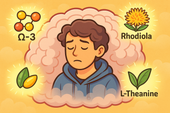
Brain Fog and Body Dysmorphic Disorder: Can Nootropic Supplements Help?
Brain fog often accompanies Body Dysmorphic Disorder, clouding focus and deepening emotional fatigue. Nootropic supplements like L-theanine, Rhodiola, and CoQ10 can help restore mental clarity, balance neurotransmitters, and bring calm energy back to the mind 🌿🧠.
-

How Stress Hormones Like Cortisol May Worsen Body Dysmorphic Disorder
Chronic stress floods the brain with cortisol — the hormone that keeps you on high alert. In Body Dysmorphic Disorder, this chemical overdrive fuels anxiety, distorts self-image, and traps the body in survival mode. Calming cortisol helps restore both peace and perspective 🌿🧠.
-

The Role of Neurotransmitters in BDD—and How Supplements May Help
Neurotransmitters like serotonin, dopamine, glutamate, and GABA shape how people with Body Dysmorphic Disorder perceive themselves. When these brain messengers fall out of balance, perception distorts — but targeted supplements can help restore calm, focus, and emotional regulation 🧠🌿.
-

What Is Body Dysmorphic Disorder? A Deeper Look at the Mind-Body Connection
Body Dysmorphic Disorder (BDD) isn’t just about appearance — it’s about perception. When brain chemistry, trauma, and stress distort self-image, the mind begins to see flaws that aren’t truly there. Healing starts by calming the nervous system and reconnecting mind and body 🪞🧠.
-
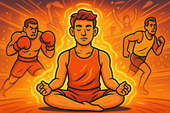
Keeping Calm in Competitive Sports: How to Train Your Mind, Body, and Chemistry for Peak Performance
Competitive pressure can overwhelm even the strongest athletes — but calm is trainable. By combining supplements like magnesium, L-theanine, and adaptogens with breathwork and mindset training, you can stay focused, balanced, and in control under any level of stress 🧠🏅.
-
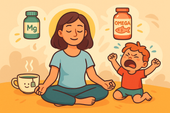
Supplements for Parents Facing Toddler Tantrums: Staying Calm When Little Emotions Run Wild
Toddler tantrums can drain even the most loving parent — but your calm is powerful. With the right supplements like magnesium, L-theanine, and ashwagandha supporting your nervous system, you can stay patient, grounded, and kind, even when emotions run high 🧸🌿.
-

Workplace Stress and Anger Management Support
Workplace stress can quickly turn into frustration — but calm is a skill you can train. By combining supplements like magnesium, L-theanine, and adaptogens with breathwork and mindset tools, you can stay focused, patient, and emotionally grounded no matter how intense the office gets 💼🌿.
-

How to Stay Patient With Family During Stressful Holidays
Holiday gatherings can stir up old stress and test your patience — but calm is possible. With nervous system support from magnesium, L-theanine, and adaptogens, plus mindful breathing and clear boundaries, you can stay centered, kind, and grounded even when family chaos unfolds 🎄💞.
-

Supplements to Keep Calm During Traffic Jams
Getting stuck in traffic doesn’t have to ruin your mood. With calming supplements like magnesium, L-theanine, and ashwagandha, you can train your body to stay relaxed and focused behind the wheel — turning gridlock into a moment of grounded patience 🚗🌿.
-
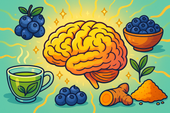
The Role of Antioxidants in Healing Brain Stress from Dissociation
Antioxidants protect the brain from the oxidative stress caused by trauma and dissociation. By neutralizing free radicals and supporting mitochondrial recovery, they help restore clarity, focus, and emotional balance — allowing the mind to heal at the cellular level 🌿🧠.
-
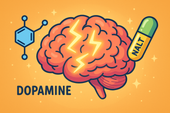
N-Acetyl L-Tyrosine (NALT) for Supporting Mental Clarity
N-Acetyl L-Tyrosine (NALT) fuels dopamine production — the neurotransmitter of focus and motivation. By supporting brain chemistry during stress, NALT helps restore mental clarity, energy, and alertness, making it easier to think clearly and feel present again ⚡🧠.
-

How Ginseng May Improve Focus and Energy in Dissociation
Ginseng helps combat the mental fatigue and fog that often come with dissociation. By supporting mitochondrial energy, balancing neurotransmitters, and regulating cortisol, it gently restores focus, motivation, and emotional presence — helping the mind reconnect with clarity and strength 🌿⚡.
-
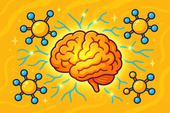
Phosphatidylserine and Dissociation: Supporting Cognitive Function
Phosphatidylserine helps calm the stress response by balancing cortisol, the body’s primary stress hormone. By lowering cortisol spikes, it protects memory, focus, and emotional stability — restoring clarity and mental presence for those struggling with dissociation 🧠🌿.
-
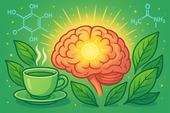
Can Green Tea Extract Help with Dissociative Brain Fog?
Green tea extract may help lift dissociative brain fog by supporting neurotransmitter balance, reducing inflammation, and enhancing energy at the cellular level. With its key compounds EGCG and L-theanine, it promotes calm focus, clarity, and emotional presence — helping you feel more alert and grounded 🍵🧠.
-
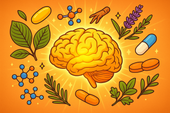
Building a Natural Supplement Stack for Dissociation Support
Building a supplement stack for dissociation means nourishing the brain and body back into communication. By supporting neurotransmitters, gut health, and energy balance through nutrients like magnesium, omega-3s, curcumin, and probiotics, you can help restore clarity, calm, and connection — one layer at a time 🌿🧠.
-

Chamomile and Lavender for Dissociative Anxiety Relief
Chamomile and lavender work together to calm dissociative anxiety by soothing the nervous system and restoring emotional safety. Their natural compounds balance cortisol, enhance GABA activity, and activate the vagus nerve — helping you feel grounded, connected, and at peace again 🌿💜.
-
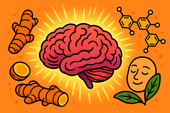
Curcumin for Inflammation and Mental Clarity in Dissociation
Curcumin, the golden compound in turmeric, does more than fight inflammation — it helps clear the mental fog often tied to dissociation. By calming neuroinflammation, balancing neurotransmitters, and supporting mitochondrial energy, curcumin can restore mental clarity, focus, and emotional presence 🌿🧠.
-
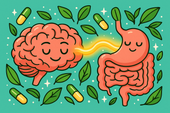
Probiotics and Dissociation: Exploring the Gut–Brain Axis
The gut–brain axis plays a vital role in emotional awareness and presence. When the microbiome is balanced, it supports serotonin production, vagus nerve activity, and calm focus. Probiotics help repair this connection — restoring safety, clarity, and the feeling of truly being in your body again 🌿🧠.
-
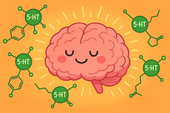
5-HTP for Dissociation: Supporting Serotonin and Emotional Stability
5-HTP helps bridge the gap between emotional numbness and stability by supporting serotonin production — the neurotransmitter that shapes mood, sleep, and sensory awareness. For people experiencing dissociation, 5-HTP may gently restore connection, presence, and emotional balance from the inside out 🌿🧠.
-
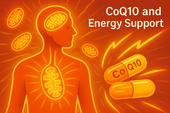
CoQ10 and Energy Support for People with Dissociation
Chronic dissociation often leaves the body running on empty — tired, foggy, and disconnected. CoQ10 helps recharge that system at the cellular level by restoring mitochondrial energy, reducing oxidative stress, and supporting the brain’s capacity to stay present. It’s energy medicine for both body and mind ⚡🧠.

















































